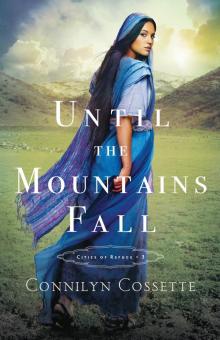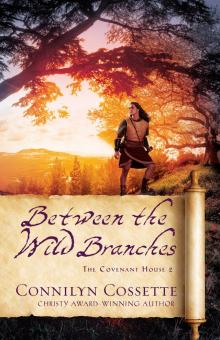- Home
- Connilyn Cossette
Shelter of the Most High Page 9
Shelter of the Most High Read online
Page 9
Three of the men waved to me, calling out a friendly “shalom,” but the other shepherd watched me intently as I passed. He was not yet a man, a boy of perhaps fourteen or fifteen, without much of a beard on his sun-browned face. Something about his perusal unnerved me, and I glanced over my shoulder when I finally made it past the woolen blockade. His gaze was still pinned on me, even as a trio of ewes broke free of the herd to wander off toward the tree line, and I surmised that he was irritated by my intrusion.
The sun had nearly risen past the eastern ridge, and I had no time to contemplate the strange young man or stop to apologize. However, the rough-hewn staff he carried had given me an idea for a way to bridge the gap between Sofea and me. . . .
Rounding the southern curve of the city walls, I picked up my pace near the gates, already opened wide to welcome early-morning travelers and those in need of refuge in Kedesh. Chaim, the commander of the guardsmen and a friend of mine for the past eight years, lifted a palm in greeting as I passed, but determined to win this wager, I lengthened my stride, ignoring both him and the screaming burn in my thighs and shins.
The glare of the sunrise blinded me for a few moments as I searched out the place I’d left Darek and Baz. The big man was hard to miss, and even from twenty paces away I could see the broad smile stretched across his thick-bearded face. Darek was leaning against one of the terebinth trees, arms folded and humor in his own expression.
Baz’s grin grew impossibly wider as I skidded to a stop in front of them, heaving as I forced air into my burning chest. After a sly gesture toward the fully risen sun, he clapped his beefy hands together. “This will be entertaining.”
A groan slid from my mouth as I bent forward with my palms on my thighs, still gasping for breath. “What are you going to do to me?”
Baz grinned with menacing glee and a conspiratorial wink toward Darek. “Patience has never been among your strengths, my boy. I think it’s time we show you how to be still.”
Sofea
“What is he doing out there?” Leaning my chin on the sill, I peered through our window into the courtyard to where Eitan had been standing motionless since early this morning. All through the meal, he’d stood at the center of the space, eyes on the far wall, saying nothing, doing nothing—just standing.
Moriyah and the two other women who worked here in the inn simply maneuvered around him, going about their chores without so much as a glance his way—as if it were perfectly normal for a man to stand in a courtyard for hours on end. The only people to pay any attention to him other than Nadir, who’d stopped by for a few moments but left after Eitan refused to respond, were Abra and Chana. The girls held hands and did a little dance around his long legs, singing a chanting song that spun faster and faster until they tripped over their own feet and fell down. Then they stood in front of him for a while, making faces and doing their best to break his composure. From the disappointment in their expressions, he had not been swayed by their silly game.
Before they’d given up, however, Chana had pulled a wide stool over to him and climbed atop it. Then she’d untied his hair from the large knot at the base of his neck. It spilled down his back, a waterfall of deepest brown that rivaled my own in length. The girls had then taken turns standing on the stool, twisting the long strands into a multitude of small braids, tying each with a snip of thread. Eitan had not moved one muscle throughout this treatment, allowing the girls to delight themselves in grooming him. Was this some sort of dare he’d taken on? To stand in the courtyard without moving or speaking?
“Why do you care?” Prezi startled me by responding to my mumbled musings from her seemingly permanent spot on the bed. “I thought you wanted to leave this place.”
“I do.” I kept my voice measured and my expression flat as I answered. “Simple curiosity.”
Her extended silence goaded me to step off the stool I’d been standing on to look out the high window. Crossing the room to collect her used bowl and cup from the little table by the bed, I avoided the suspicious look she turned on me.
“Sofi—”
I spoke over the question I knew she was asking. “I’ll be asking Kitane to take us with her when she leaves after the festival.”
Although she narrowed her eyes, she let the matter of Eitan drop. “My foot is still not able to carry my weight. How will we go with her?”
I brushed off her concern with a wave of my hand. “I am sure they will let you ride in their wagon. We cannot let this chance to return north pass us by. Kitane can help us find others who speak our language. We cannot stay trapped here with people who can’t understand us.”
“And if she refuses?”
“She won’t.” I had full confidence in my powers of persuasion.
Prezi shrugged a shoulder, her expression blank as always. “It matters little to me.”
Heart aching from the drastic shift in my cousin’s behavior, I stacked the cup inside the empty bowl, grateful that Moriyah had somehow convinced her to finally start eating again. “Will you come to the festival?”
“I can’t walk, Sofi.”
“You can lean on my shoulder. Please, I don’t want to go alone, and Kitane said that the entire city will take part.”
“You don’t serve these people’s god. Why go?”
“I am curious to know what kind of god they worship. Kitane says they only venerate one. It’s very strange, but she says—”
“Don’t you remember the last time you forced me to go to a ritual with you?” she spat out, a dark shadow passing over her countenance.
I flinched hard as the memory loomed, and as I did so, the wooden cup tipped out of the bowl in my hands and clattered to the stone floor with a hollow sound. I’d been ten when I convinced Prezi to sneak through the night with me, to follow the pounding drums and wailing chants up a high hill near our village. My mother had gone with my father, his other wives, and a large group of revelers to venerate the goddesses of fertility, and I’d always been desperately curious to know what transpired during such rituals. What the two of us had witnessed in the sacred grove so confused and shocked me that I was unable to look my mother, or Prezi, in the eye for many days. The two of us had fled within minutes, and I cursed myself for dragging my cousin into such foolishness for the entire silent trek down the hill and all the way back to our dark village, where we slipped silently under our blankets. We’d not spoken a word about that night since.
My throat burned with bile as I blinked away the disturbing thoughts. “I don’t think this festival is the same.” I did not add that I was clinging to the hope that the priestess we’d come to live with had no plans to offer us to her One God. Whether she counted us as slaves or not, I spent every moment I was not with Prezi helping with meals or aiding Binah and Sarai as they cleaned the inn, hauled water, and worked the looms, desperate to display our usefulness just in case I was wrong.
“You have no way of knowing that. And like I said, I cannot walk, and I won’t be carried about like a child.” Her disdainful tone, so opposite of the soft and kind one I was used to, somehow sparked a frisson of anger in me.
“Are you planning to stay in this room for the rest of your life? Will you simply curl up in a ball and wait for death? I lost my family too, you know. Even though I did not see them—” I cut myself off, knowing neither of us needed the reminder of the sight of her parents’ bloodied corpses. I saw enough of it whenever I closed my eyes. And from Prezi’s moans and the shuddering that shook our bed each night as I lay awake next to her, dreading sleep, the same demons plagued both our dreams.
I softened my tone. “You are all I have left, Prez. I am scared and I am lonely for my friend. My sister.”
Her jaw tightened and she glanced away, her dark eyes not revealing anything. “You should have let me drown,” she said, so low I barely made out the words.
For the rest of my days I would never forget the sight of my sweet cousin’s body jerking in agony as Seno lashed her back for my sake, n
or the despairing void that had consumed me when she sank beneath the waves after his fist knocked her unconscious.
“I will never let you drown,” I said. “I will always fight for you. To my last breath.”
CHAPTER
TWELVE
Festival of Shavuot
6 Sivan
Every shred of hope that I’d clung to over the past weeks melted away as soon as I awoke to find Binah at the door with two pure white tunics slung over her shoulder. Deep lines surrounded her pursed mouth as she regarded us from the doorway with mud-brown eyes, her demeanor suggesting she did not relish the task of retrieving us.
After setting a large pot of water on the small table in the corner, along with a towel and a chunk of natron, she scrubbed at her own black curls to indicate that Prezi and I should wash our hair along with our bodies. In silence, she spread the simple white tunics on the bed and swept out of the room, taking the remnants of last night’s rare peaceful sleep with her. The sickly sweet smell of flowers wafted from the water pot, a harbinger of the awful truth.
A renewed vision of that girl hurtling toward the rocky seabed, garbed in pure white, locked into place. At my father’s insistence, her body had been ritually washed and anointed with fragrant oil before he himself pushed her over the cliff—a fitting offering to the god of the sea, a beautiful maiden dressed for death.
Moriyah had lulled me into complacency, luring me with false interest in my family, false concern for my cousin, and a pretense that we were merely guests in her home instead of oblations for this harvest festival. No matter how hard I’d worked at proving my worth in this household, we would die today for the sake of Hebrew crops in the year to come. A deep throb of pain pulsed in my chest. We’d been betrayed yet again. What could I do? What would I say to Prezi?
Two mornings before, as I’d gone to leave the room, a stick that had been leaning against the wooden door clattered to the ground. After looking back and forth to see whether one of the children had been playing a game with me and seeing no one in the courtyard, I plucked the stick off the ground to examine it, thinking perhaps it was a shepherd’s staff someone had misplaced. The long stick was tapered, finely sanded, and fitted with a cross bar at the top that was wrapped in soft wool. When its use was made clear in my mind, I’d laughed aloud. Someone had fashioned a crutch for Prezi, which would allow her the ability to move about without being carried while her mangled foot healed.
It had taken me hours, but I’d finally convinced her to try the apparatus, and by the time she’d become proficient at walking around our small room, the tiniest spark of life had bloomed in her eyes, and gratitude for whoever had made such a thing filled my heart to overflowing. She’d even conceded to my pleas to attend the festival. If only she were not stepping out of her room for the first time in weeks to be destroyed in the name of some foreign deity who called for our blood.
There was nothing I could do to avoid this fate. We were trapped inside a city with high, thick walls and heavily guarded gates. Surrounded by warriors like Darek and Baz. I could only hope that whatever method of death they had planned for us would be swift.
It would profit nothing to frighten my cousin, so instead I measured my breaths as I took my time scrubbing my body, then dressed in the linen tunic and helped Prezi do the same. If only the sweet-smelling water could wash away my terror as well.
A stoic Binah appeared in our room again and, with a brusque jerk of her head, indicated that we should follow her. Each slap of our sandals on the stone floor, each echo of my cousin’s wooden crutch clicking through the deeply shadowed and empty inn brought us one step closer to whatever was on the other side of the door. I slipped my hand into Prezi’s. If these were our final moments together, I’d let nothing come between us.
To my great astonishment, I realized that everyone was wearing white today. From the tiny child perched atop her father’s shoulders peering over the bustling crowd to the old shopkeeper leaning on a knotted cane in a doorway, the people of Kedesh were an undulating sea of purest white. Binah kept her pace slow for Prezi’s sake, so the flow of bodies moving toward the center of town parted around us. How had I not noticed that she too was clad in a white dress as she led us through the inn?
Many of the people carried baskets of goods—barley, wheat, and various vegetables—and a few of them led goats and lambs on tethers. The children carried long-stemmed wildflowers and fistfuls of barley stalks.
Although seeing everyone dressed in similar garb made me second-guess the assumption I’d made about our role in this festival, the closer we came to the temple at the center of town, the more my knees began to tremble. I gripped my cousin’s hand a bit tighter as I wondered how long it would be before they singled us out, dragged us to the altar, and finished whatever Darek had begun by finding us on that beach.
Searching the crowd for the group of people who had become so familiar in these past weeks, I spotted Chana first. Seated high on Eitan’s shoulders, the little girl clung to her brother, her palms clamped to his cheeks as if she would tumble backward at any moment. Next to Eitan, Abra bounced on the balls of her feet, again and again, attempting to see over the wall of white-clad bodies. Nadir stood on his other side, watching as I approached. His eyes darted to my cousin, and surprise flitted across his features. Remembering that Nadir had been carving the handle of a knife the day Moriyah and I had gone to the foundry, I wondered if it had been he who had created the crutch for Prezi.
To my shock, Moriyah appeared in front of us, placing a kiss on Prezi’s cheek and then my own. I’d not expected her to be among the celebrants, but nearer the temple where the rituals would be performed. “Shalom,” she said, a word I’d come to gather meant she was greeting me. I stiffened, still unsure whether this priestess offered peace or destruction. A wrinkle formed between her black brows, a look of concern that I did not trust, so I shifted my attention to the gathering around me.
Craning my neck, I searched the porch of the small temple but could see no signs of an altar, nor any depictions of the Hebrews’ One God. I’d visited the temple on my island twice a year, at each solstice, and remembered well the various carvings set upon pedestals, the gods our people had imported from the ancient homeland we’d come from, as well as those we’d gathered into the fold of worship as we made peace with various tribes and peoples from all around the Great Sea. But here, at the center of Kedesh, there were no carvings, no sacred trees, no smoldering incense burners. What sort of bizarre religion did these people hold to? And now that I considered the lack of gods here, I remembered that I’d not seen any statues or engravings at the inn, nor did the people around us wear any amulets. There were plenty of niches built into the walls, perfect places to set household gods or small home altars, but they sat empty, or were used as shelving for small pots, cups, or other mundane items. Not once had I seen a carving of a deity since I’d entered Kedesh.
They don’t tolerate other gods, Kitane had said the day I’d met her, and I wondered if the one she had tied about her neck, hidden beneath her dress, was the only depiction of a deity in this town.
Regardless of the lack of graven images of this unknown god, if this were a festival to celebrate harvest, offerings must be made, and as my mother had told me the day I’d seen that white-clad girl plunge from the cliff and into the waiting arms of Posedao, nothing appeased a god and ensured a plentiful harvest like blood.
A large group of men, clad also in white tunics and white head coverings, stood near the temple, accepting baskets of produce, jars of grains, and jugs of wine and beer. They disappeared time and time again into the temple. Was the statue of their One God located within? This god must be a greedy one indeed for so much food and drink to be laid at his feet. Everyone gathered in this square seemed to have something to give. Would all of this be burned on an altar inside the temple? It seemed such a waste.
Some of the white-clad priests gathered to the side of the temple porch were making music; the drum
s, pipes, lyres, and sistra lifted a merry rhythm over the heads of the crowd. A few others began to sing, a multilayered tune that matched the instruments with perfect precision.
Voices began to rise around us to join in the song that the musicians were leading. Everyone seemed to know the words and the tune, even Chana and Abra, whose eyes shone with pleasure as they followed the melody, lifting their arms and waving the pink and purple blossoms they both clutched in their fists. The music enveloped us, and although I could not understand a word, something about the song gave my heart a buoyant feeling, as if this music were crafted to fill every bit of my body with exaltation.
This worship was nothing like the acts Prezi and I had witnessed on that high hill. In fact, the longer I watched the people around me, their faces reflecting the joyful tones of the song, the more I began to relax. The contrast between this sort of worship and that within the sacred grove on my island was like a night without stars compared to the glory of daybreak. And Moriyah, the woman I’d assumed to be some sort of powerful priestess, was simply part of the joyful crowd, her arms uplifted, eyes closed, and her upturned lips parted in melodic worship of her God.
For the first time since Binah had walked into our room with white tunics that morning, I allowed myself to hope that my assumptions about this festival, and about Moriyah, were wrong.
Then, as I caught sight of Eitan, with Chana still perched on his shoulders, bouncing to the rhythm and singing along with the song as well, the hope blossomed into near conviction. His sister gripped his cheeks harder to keep her balance as laughter seemed to bubble up from her little toes. The morning light on his face made his many freckles more prominent on his sun-bronzed skin. As relief began to trickle through my limbs and the joyful song transformed into one that encouraged a group of women to circle into a dance, I gave myself permission to study this intriguing man, if only for a few moments.

 Until the Mountains Fall
Until the Mountains Fall Between the Wild Branches
Between the Wild Branches To Dwell among Cedars
To Dwell among Cedars Counted With the Stars
Counted With the Stars Shelter of the Most High
Shelter of the Most High Shadow of the Storm
Shadow of the Storm A Light on the Hill
A Light on the Hill Wings of the Wind
Wings of the Wind